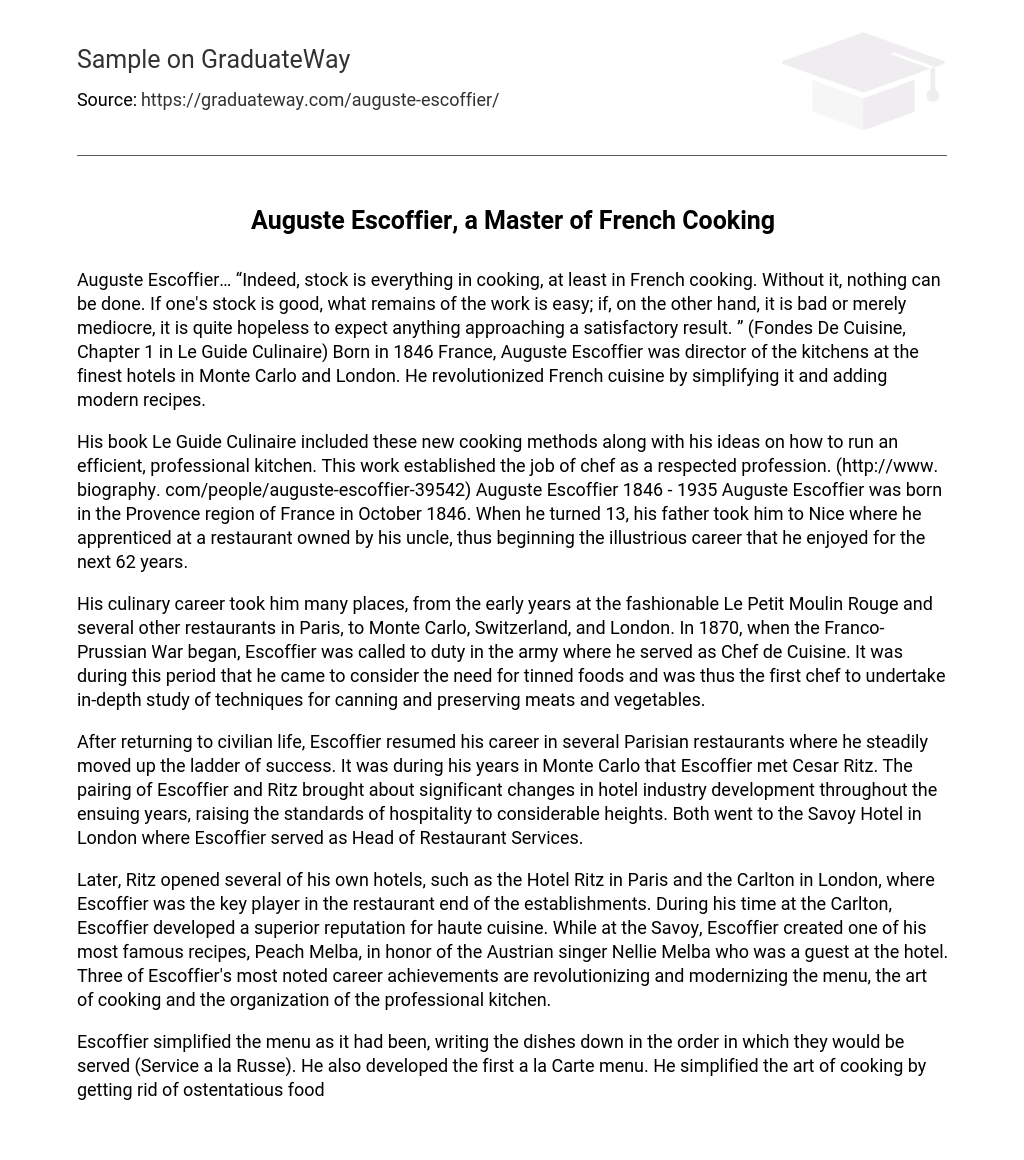Auguste Escoffier… “Indeed, stock is everything in cooking, at least in French cooking. Without it, nothing can be done. If one’s stock is good, what remains of the work is easy; if, on the other hand, it is bad or merely mediocre, it is quite hopeless to expect anything approaching a satisfactory result. ” (Fondes De Cuisine, Chapter 1 in Le Guide Culinaire) Born in 1846 France, Auguste Escoffier was director of the kitchens at the finest hotels in Monte Carlo and London. He revolutionized French cuisine by simplifying it and adding modern recipes.
His book Le Guide Culinaire included these new cooking methods along with his ideas on how to run an efficient, professional kitchen. This work established the job of chef as a respected profession. (http://www. biography. com/people/auguste-escoffier-39542) Auguste Escoffier 1846 – 1935 Auguste Escoffier was born in the Provence region of France in October 1846. When he turned 13, his father took him to Nice where he apprenticed at a restaurant owned by his uncle, thus beginning the illustrious career that he enjoyed for the next 62 years.
His culinary career took him many places, from the early years at the fashionable Le Petit Moulin Rouge and several other restaurants in Paris, to Monte Carlo, Switzerland, and London. In 1870, when the Franco-Prussian War began, Escoffier was called to duty in the army where he served as Chef de Cuisine. It was during this period that he came to consider the need for tinned foods and was thus the first chef to undertake in-depth study of techniques for canning and preserving meats and vegetables.
After returning to civilian life, Escoffier resumed his career in several Parisian restaurants where he steadily moved up the ladder of success. It was during his years in Monte Carlo that Escoffier met Cesar Ritz. The pairing of Escoffier and Ritz brought about significant changes in hotel industry development throughout the ensuing years, raising the standards of hospitality to considerable heights. Both went to the Savoy Hotel in London where Escoffier served as Head of Restaurant Services.
Later, Ritz opened several of his own hotels, such as the Hotel Ritz in Paris and the Carlton in London, where Escoffier was the key player in the restaurant end of the establishments. During his time at the Carlton, Escoffier developed a superior reputation for haute cuisine. While at the Savoy, Escoffier created one of his most famous recipes, Peach Melba, in honor of the Austrian singer Nellie Melba who was a guest at the hotel. Three of Escoffier’s most noted career achievements are revolutionizing and modernizing the menu, the art of cooking and the organization of the professional kitchen.
Escoffier simplified the menu as it had been, writing the dishes down in the order in which they would be served (Service a la Russe). He also developed the first a la Carte menu. He simplified the art of cooking by getting rid of ostentatious food displays and elaborate garnishes and by reducing the number of courses served. He also emphasized the use of seasonal foods and lighter sauces. Escoffier also simplified professional kitchen organization, as he integrated it into a single unit from its previously individualized sections that operated autonomously and often created great wasted and duplication of labor.
Throughout his career, Escoffier wrote a number of books, many of which continue to be considered important today. Some of his best-known works include Le Guide Culinaire (1903), Le Livre des Menus (1912) and Ma Cuisine (1934). As well as making changes in the culinary world, Escoffier undertook several philanthropic endeavors including the organization of programs to feed the hungry and programs to financially assist retired chefs.
Escoffier received several honors in his lifetime. The French government recognized Escoffier in 1920 by making him a Chevalier of the Legion d’ Honneur, and later an Officer in 1928. The honors due Escoffier can be summed up by a quote from Germany’s Kaiser Wilhelm II when he told Escoffier, “I am the Emperor of Germany, but you are the emperor of chefs. ” With his wife, Delphine Daffis, Escoffier retired to Monte Carlo in 1921, there he died on February 12, 1935.





